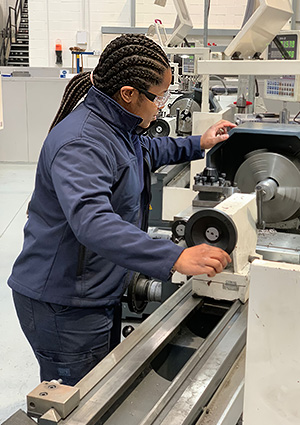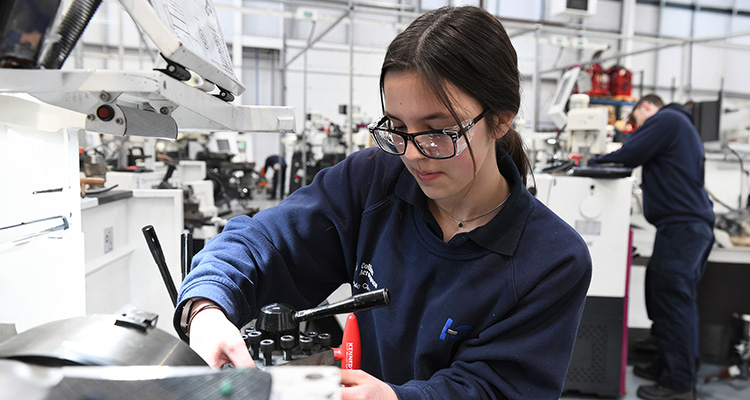Gareth Jones unpicks the results of In-Comm’s latest Training Barometer
The last 12 months have been dominated by global pressures outside of industry’s control, with a cocktail of difficulties, ranging from supply chain disruption in the Suez Canal and conflicts in Europe and the Middle East, to far reaching political uncertainty.
Rising inflation has been another key concern for businesses, so one of the most striking elements of our fourth In-Comm Training Barometer is that just 16 percent of firms feel it is having a negative impact on their training spend.

In my opinion, this shows an overwhelming desire by our sector to support the continued development of apprentices and to address the burning issue of skills, making sure that a lack of talent – both now and in the future – is not a barrier to UK manufacturing making the most out of the recent resurgence.
Encouragingly, seven out of ten management teams say they are not struggling to retain staff, with more than three quarters investing in new technology to boost productivity (an eight percent rise on last year’s report).
This finding reinforces some anecdotal information our training advisors are hearing, especially around businesses admitting they are looking at new tech to drive efficiencies rather than trying to secure a new skillset.
Mixed picture
There has been plenty of debate about a disjointed national training picture that isn’t aligned for industrial needs, and this is evident in our report.
Seventy-two percent of companies believe that there isn’t enough national Government support for training, with 44 percent wanting better funding for apprenticeships and 39 percent upskilling – this would serve both newcomers into the sector and the requirement for more flexible workforces.
We believe there is some disparity with the local picture, which is a lot more optimistic and responsive to employer needs. The prime example here is a funding boost we received from the West Midlands Combined Authority (WMCA) to support the introduction of more modularized training, helping overcome the issue of releasing staff from core operations – seen as the biggest barrier to training.
And, with 83 percent of bosses saying they would take up the opportunity of modularized training if funding was in place, there is a growing appetite for this form of training.
With the new Labour Government introducing Skills England to the landscape, there is an opportunity to shape how future spending could be directed and this will require a joint approach from employers and training providers. We need to make our collective voices heard.
Reshoring – failing before it starts?
 Last year, we reported that just 28 percent of manufacturers have enjoyed reshoring success and, despite a campaign to promote the virtues of bringing work home, this figure has decreased to just 18 percent in 2024.
Last year, we reported that just 28 percent of manufacturers have enjoyed reshoring success and, despite a campaign to promote the virtues of bringing work home, this figure has decreased to just 18 percent in 2024.
Nearly half continue to state that they don’t have the skills they need to make reshoring happen, which poses the question ‘what can we do to change this’?
There is a big piece of work to be completed here; firstly, to understand what bringing work home looks like and then what support UK companies need to do to make this happen.
This could be from the perspective of nearshoring their own supply chains or taking advantage of global customers looking to move work away from China, India and other volatile areas of the world.
Skills and the whole productivity discussion will be so important here in deciding whether businesses want to battle for reshoring work or if it is actually easier to win work in domestic supply chains.
Artificial Intelligence (AI) – not in the training game yet
The impact of AI on skills doesn’t appear to be having a big impact on the 113 companies surveyed in our barometer.
Just six percent of firms admit to embracing Artificial Intelligence to boost their skills, which isn’t surprising.
Whilst supply chains and back-office processes seem to be the main early adopters, there is still some way to go to educate businesses on how it can be used to develop workforces and support upskilling.
I believe it will follow the same trajectory as Industry 4.0 and digitization. Once slow to be adopted, data is the new gold, enabling companies to make informed real-time decisions and actions.
In conclusion
Whilst our findings show that there are challenges to the national training support, apprenticeships and upskilling still seems to be a key priority. The potential change in Government may answer some of the questions manufacturers have, but only time will tell with that train of thought will bring.
Gareth Jones
Gareth Jones is Managing Director of In-Comm Training. In-Comm Training has rewritten the rule book when it comes to bridging the engineering and manufacturing skills gap. By developing an employer-led approach to training and investing in the latest technology, the company delivers more than 500 apprentices every year, working with 750 employers across the West Midlands. It has also joined forces with Brandauer to launch the UK’s first Precision Tooling Academy, a £1m project that has already received backing from JLR to create the next generation of toolmakers.
